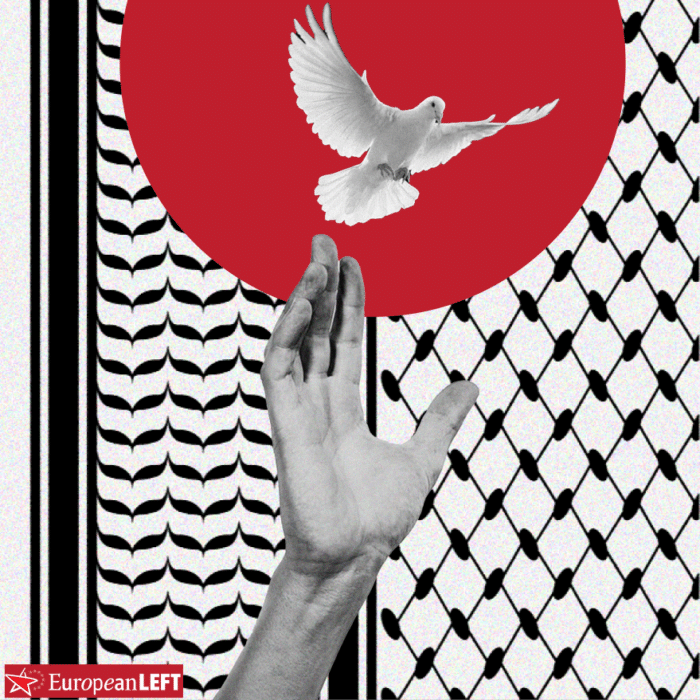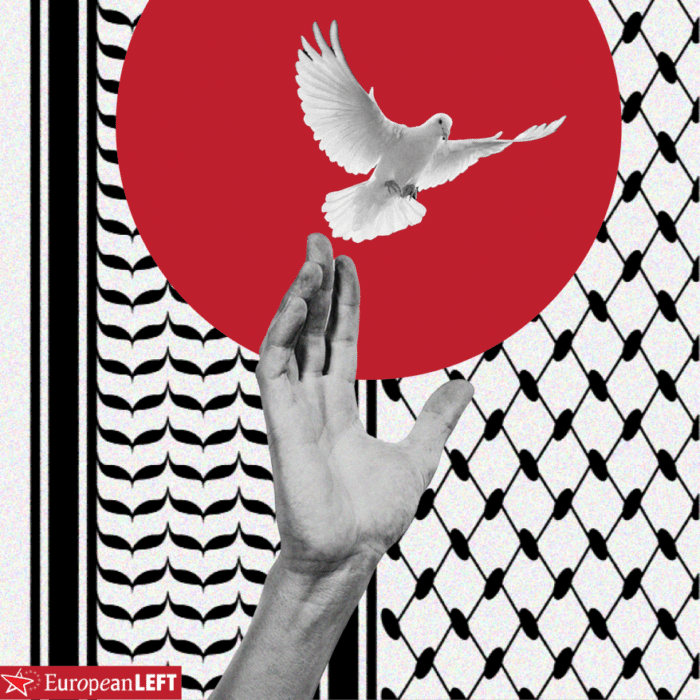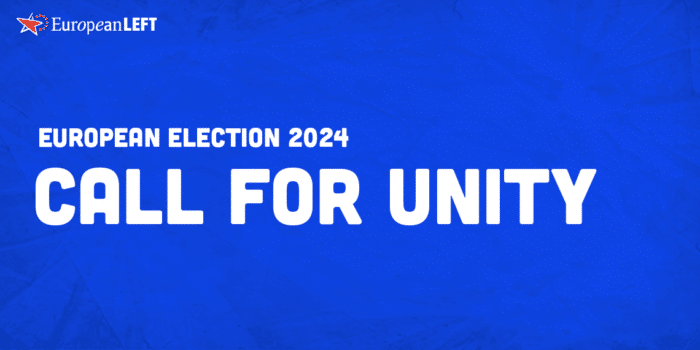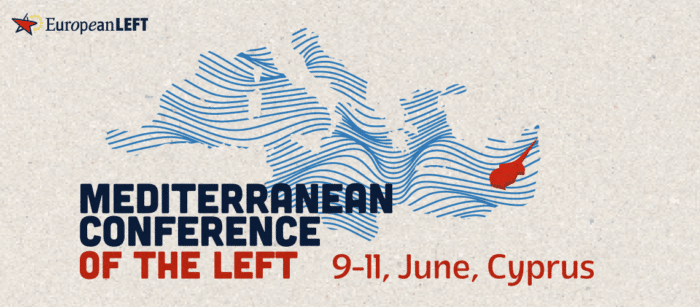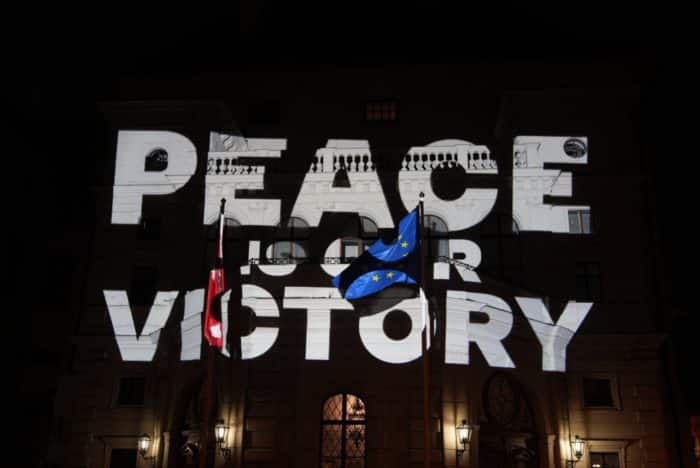
Peace
Peace is our Victory!
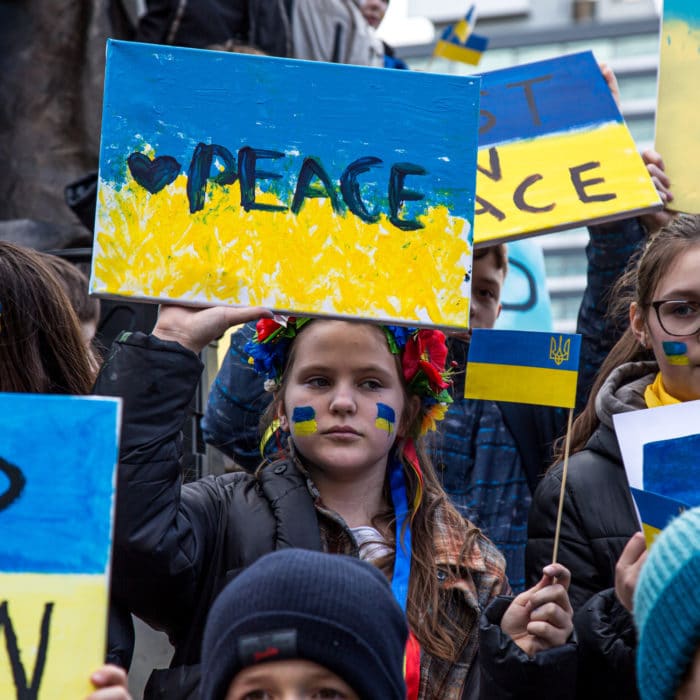
A major war is raging on the European continent
The Russian invasion of Ukraine has already caused the deaths of thousands of people, injured many more, and displaced millions, mainly women and children. Vital infrastructure has been destroyed, land contaminated, and the future of the people blighted. Prices of energy and food have skyrocketed internationally as a result of the war. Those who have been hardest hit are the poor, and those living and working under precarious conditions. The risk of the war expanding is considerable – whether on the ground to neighbouring countries, or through the use of nuclear weapons, which would cause hundreds of thousands of deaths and impact the lives of every single one of us.
This terrible war is a tragedy, and one that must be brought to a speedy conclusion. We wholeheartedly condemn the aggression of the Russian Federation, and we recognise that every day this war continues, more innocent civilians will die. We demand a ceasefire – an end to the killing – now. Russian troops must withdraw and there must be negotiations to bring peace to Ukraine. Part of bringing peace to Ukraine must be a recognition that existing European structures failed to prevent this war from happening and are currently failing to stop it.
The war in Ukraine has created a new and uniquely dangerous situation, not just in terms of warfighting. It has also altered the political balance in Europe, and is accelerating its militarisation, which will have a profoundly negative impact on our societies. The far-right is feeding off nationalism, generated by warmongers on all sides, and glorifying militarism, exploiting the refugee crisis, as well as stoking racism and xenophobia. This is not the future we want for our continent.
We do not want an increasingly militarised and brutal Europe.
We need to see a new approach to security in Europe out of the ashes of this war. One that is based on dialogue and political agreement, and a recognition that no state or community can be secure without others experiencing that same level of security. This is a concept whose time has come.
We can build a Europe of peace, cooperation between peoples, democracy and progress, but this means a change in approach by the European Union (EU) and by its Member States. We are seeing them putting more money into military spending and less into social spending. This will increase the danger of war for us all, and decrease our wages and living standards at a time of great hardship. We do not want more missiles and tanks, guns and mines: we want better schools, hospitals, homes and jobs. Changing where our money goes is part of building a Europe at peace – and for peace.
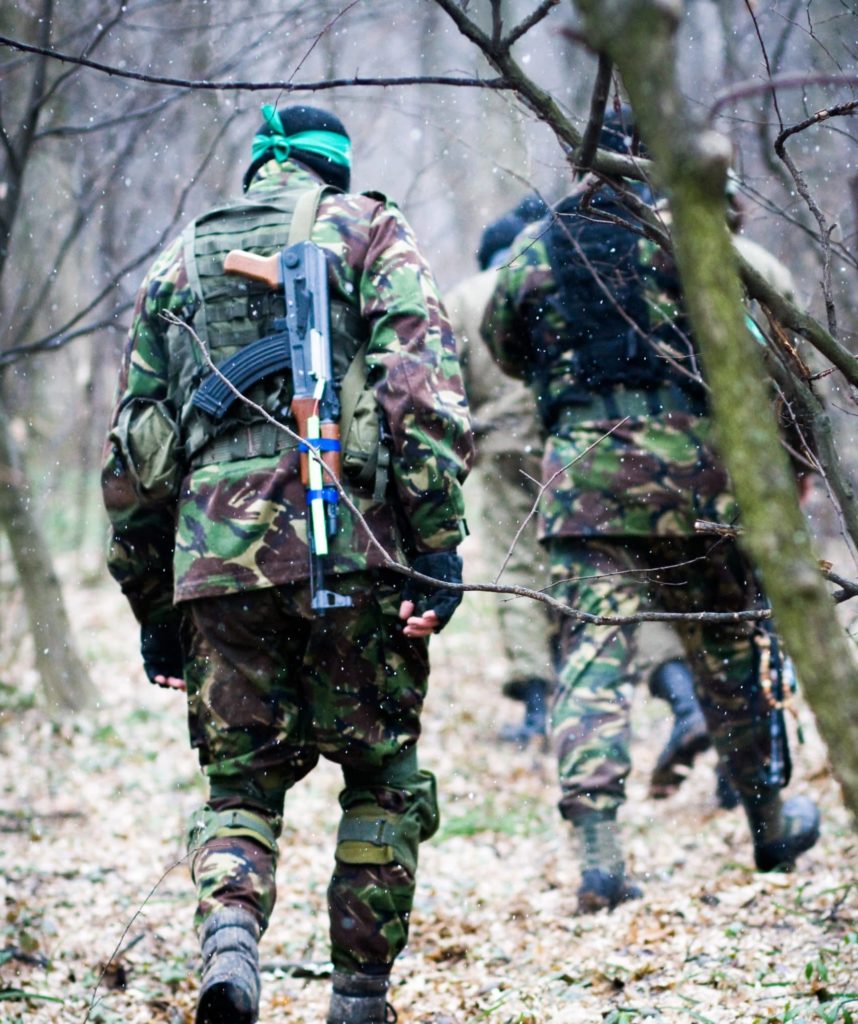
Military expenditures and the military burden, by region 20011 – 2020 in USD at (2019) constant prices and exchange rates*[1]***
| 2011 | 2012 | 2013 | 2014 | 2015 | 2016 | 2017 | 2018 | 2019 | 2020 | |
| Europe | 325 | 328 | 323 | 327 | 336 | 348 | 339 | 346 | 336 | 378 |
| Central Europe | 19,0 | 18,7 | 18,5 | 19,7 | 22,3 | 22,6 | 24,4 | 27,5 | 31,1 | 33,6 |
| Eastern Europe | 58,6 | 67,5 | 70,6 | 76,2 | 82,4 | 87,0 | 71,9 | 70,5 | 74,3 | 76,8 |
| Western Europe | 247 | 242 | 234 | 231 | 239 | 243 | 248 | 258 | 268 | 273 |

Peace in Europe
We missed a big opportunity to put peace in Europe on a stable footing at the end of the Cold War.
When the Warsaw Pact was wound up in 1991, there were hopes that NATO would be dissolved too and international relations would be founded on a new basis, putting the principles of the UN Charter into force. After decades of tension, there was great hope for a more just and peaceful world, built on political agreement, and not on military alliances. It was also hoped there would be a peace dividend, with vast sums going from the military into social spending.
This did not happen. Instead, the US devised a new strategy – the Wolfowitz Doctrine of 1992. This stated that the US was the world’s only remaining superpower and proclaimed its main objective was to retain that status. That approach has determined US actions ever since – and NATO, which was now redundant in terms of its initial mission statement as a Cold War alliance, was repurposed to support the US in that objective, expanding its remit and its territory. Europe has been caught up in that process ever since. But that US goal ignores how the world has changed: that we now live in a multi-polar world, and trying to force it to remain uni-polar will just lead to more wars. We should not be the US’s ally in that goal any longer – to remain so makes Europe a likely battleground.
The war in Ukraine makes that very clear – there is an increasing risk of nuclear war in Europe. The peoples of Europe feared a nuclear war between the US and what was then the Soviet Union, in the 1980s. There was massive popular protest and most nuclear weapons were removed from Europe. Now they are coming back. The US is bringing new upgraded nuclear weapons to several countries in Europe, and Russia is bringing them to Belarus, claiming that if it is OK for the US to do that, then it is OK for Russia. These weapons put us all on the front line and we must get rid of them once again. The same goes for foreign troops present in Europe – there are over 63,000 US troops stationed here, over half of those in Germany, having been there for many decades.
Europe as a force for peace in the world
Europe must make its own way in the world, and determine its own relationships, based on peace, respect between nations, and respect for human rights. We need to have strategic autonomy from the US, to be an independent continent; not to be even more militarised, but to play a constructive global role to face and resolve crucial issues, like the climate emergency, pandemics, scarce resources, and population movements. Collectively, humanity is facing existential threats and we need to understand ourselves as part of a global community to deal with them.
Nuclear weapons constitute one such threat and Europe has the opportunity to help eradicate nuclear weapons and the risk that they present – total annihilation. The UN Treaty on the Prohibition of Nuclear Weapons (TPNW) came into force in 2021, initiated by the countries of the global South, to outlaw nuclear weapons. Many countries support that Treaty, but most European countries do not, despite the risks they present. It is time for the EU and all countries of Europe, to stand against these weapons, and secure the de-nuclearisation of our continent – kicking out nuclear weapons and signing up to the TPNW. It is not acceptable that nine States with nuclear weapons – two of them in Europe – have the capacity to destroy us all. All nuclear weapons must be eradicated, and the resources released must be deployed to better the lives of us all.
Since the end of the Cold War there has been a steady reduction in nuclear arsenals globally, but this has now changed and since 2022 they have been increasing. Arms control treaties have been abandoned and the risk of unrestrained nuclear activity is looming. NATO, as a nuclear-armed military alliance with a first-use policy, needs a change of course and its European members must exert pressure to this end. At the moment NATO is a big part of the nuclear problem, not part of the solution.
NATO membership ties European states into the US agenda and this is currently taking Europe into confrontations that are not of its people’s choosing. While the US/NATO focus is primarily on Ukraine, its long-term orientation is towards a military build-up in the Asia-Pacific region to prevent China from emerging as a global power and maintaining US dominance. NATO will now treat China as a ‘full-spectrum systemic rival, rather than a purely economic player’. The great danger is that NATO’s policies have not only backed Russia into a corner through military expansionism, but that they will now also do the same with China. This approach will not help stop a war – instead, the danger is it will start one.
Europe does not need to make more enemies on the back of a subordinate relationship with the US. Europe needs peaceful and strong relationships worldwide, good trading links, cooperation on education, sport and culture, supporting even global development, and ending its legacy of colonial relationships in the global South. Europe must be a good partner for peace and prosperity, not a continent that brings war and catastrophe to others.

21st-century security – environment and peace
War is a big polluter and the war in Ukraine is no exception – military emissions are sky-high. According to calculations by the Dutch climate researcher Lennard de Klerk, the war in Ukraine caused 120 million tonnes of CO2 emissions in its first year, which is equivalent to the annual emissions of a country the size of Belgium.
The UN Environment Programme has pointed to a toxic legacy for generations to come, with thousands of possible incidents of air, water and land pollution and the degradation of ecosystems, including risks to neighbouring countries. In addition, there are serious and lasting consequences from some of the weaponry in use. Depleted Uranium munitions, supplied by the US and UK are known to bring cancers, birth defects, and other lasting health impacts to local populations. The impact on agricultural land affects food supplies far beyond the war zone, impacting on many peoples.
But the impact of military emissions on Europe is not confined to times of war – even in normal times armed forces are among the biggest polluters on the planet. Yet they manage to avoid scrutiny. Because of a let-out in the Paris climate agreement, governments do not have to provide full data on greenhouse gases being emitted by armed forces. The total of the world’s militaries, together with the industries that manufacture their equipment, is estimated to be responsible for around 6% of all global emissions, and Europe plays a part in that – its military sectors have an annual carbon footprint equivalent to emissions from at least 14 million cars.
NATO organises regular massive exercises over and across Europe which contribute to this footprint, as well as contributing to military and political tensions. The recent Air Defender 23 is the largest deployment exercise of air forces in NATO’s history. It involved 10,000 participants from 25 countries with 250 aircraft – 100 from the US – undertaking training operations in European airspace under the command of the German Air Force.
The CO2 emissions of this large-scale manoeuvre amount to 220,000 tonnes, which is equivalent to the annual emissions of a city of 30,000 inhabitants.
At a time when the world faces catastrophic climate change, war and military activities not only contribute to the problem, they also divert resources from solving the problem. And they make it more difficult for a global solution to be found when major States that need to work together to resolve so many challenges are in a state of conflict.
Now more than ever we need to adopt a broad concept of security, which addresses the two existential threats that we face – climate change and nuclear war. And we need policies and actions that will reduce and eventually remove those threats. Our concept of security is one of genuine human security, not of killing and increased militarisation, or the further expansion of military blocs, but of human rights, respect for all, dignity and meeting people’s needs. This is our vision for Europe – a continent at peace and for peace.
[1] SIPRI Yearbook 2021 Armaments, Disarmament and International Security, p. 251
[2] ZDF: Klimaforscher berechnen Emissionen Diese Folgen hat der Krieg (7.6.2023) https://www.zdf.de/nachrichten/panorama/klima-fussabdruck-ukraine-krieg-russland-100.html
News about peace

Related press releases
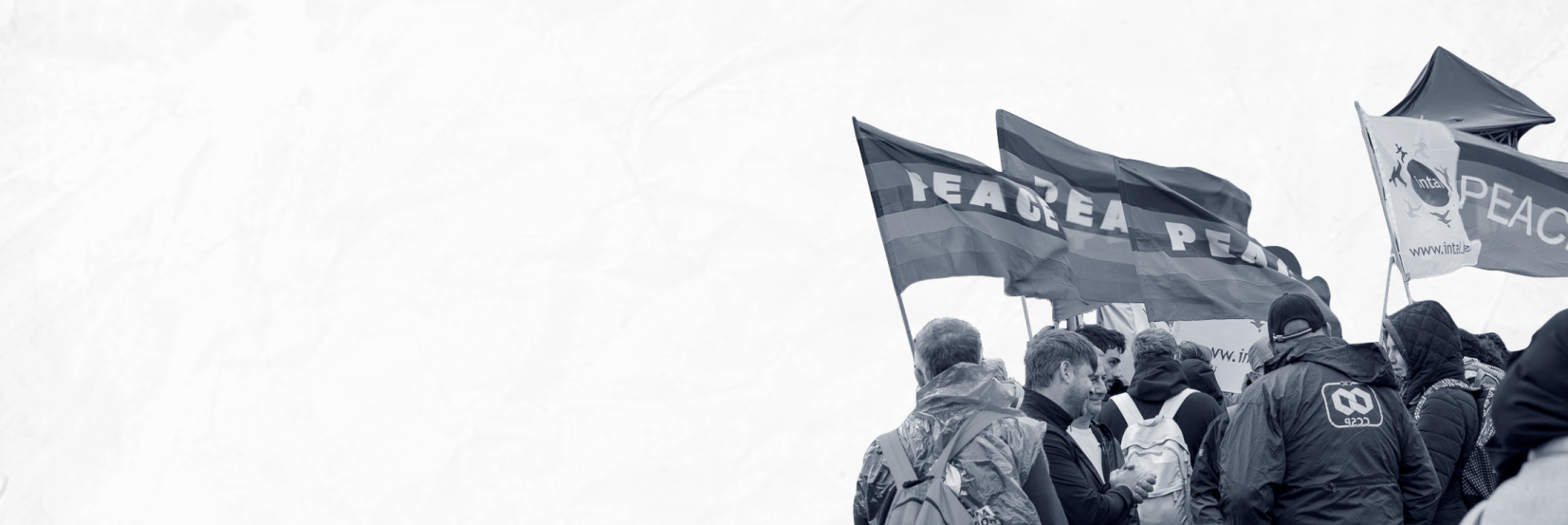
contact us!
Want to join the EL ? Any questions ?
Get in touch with us by mail, we will get back to you as soon as possible.
